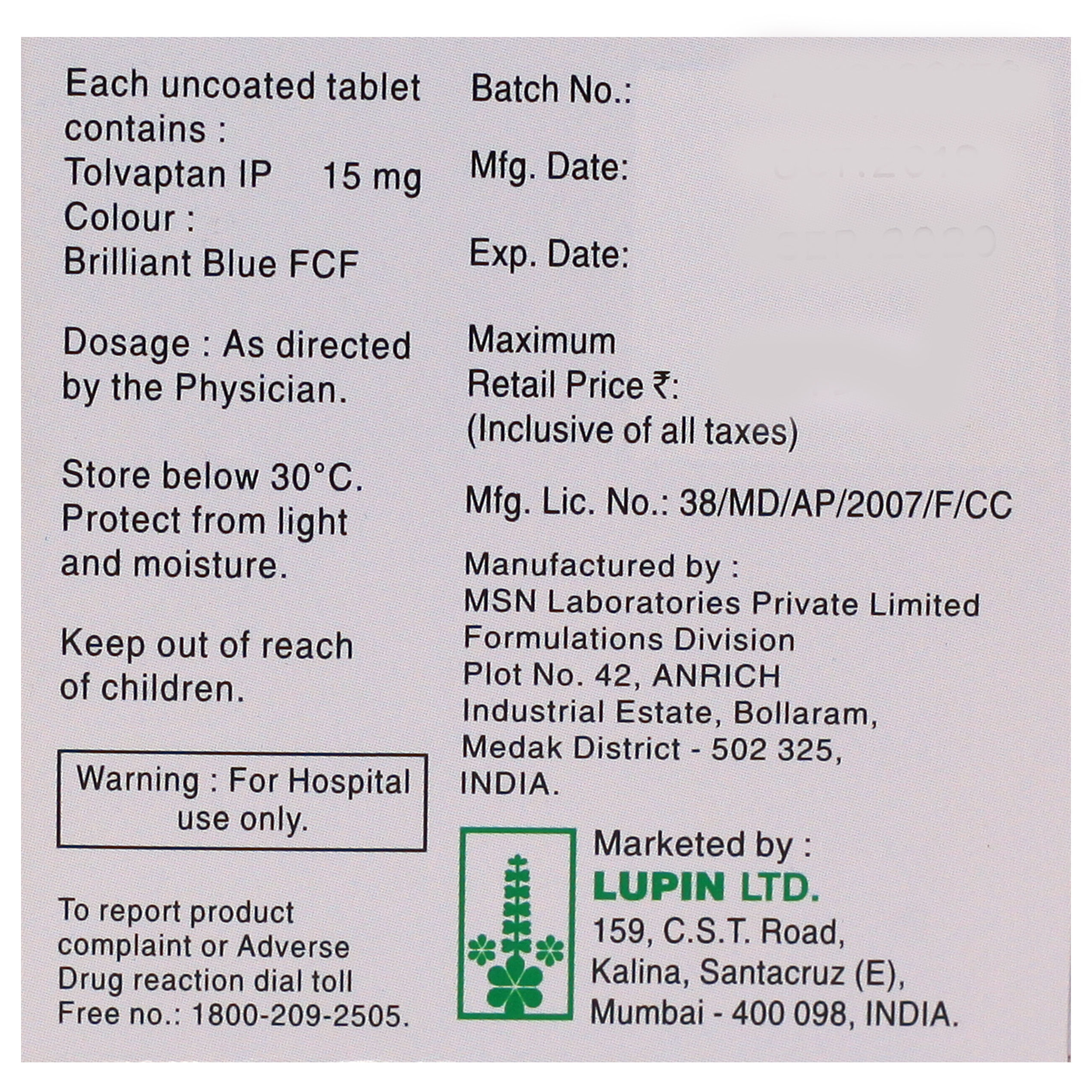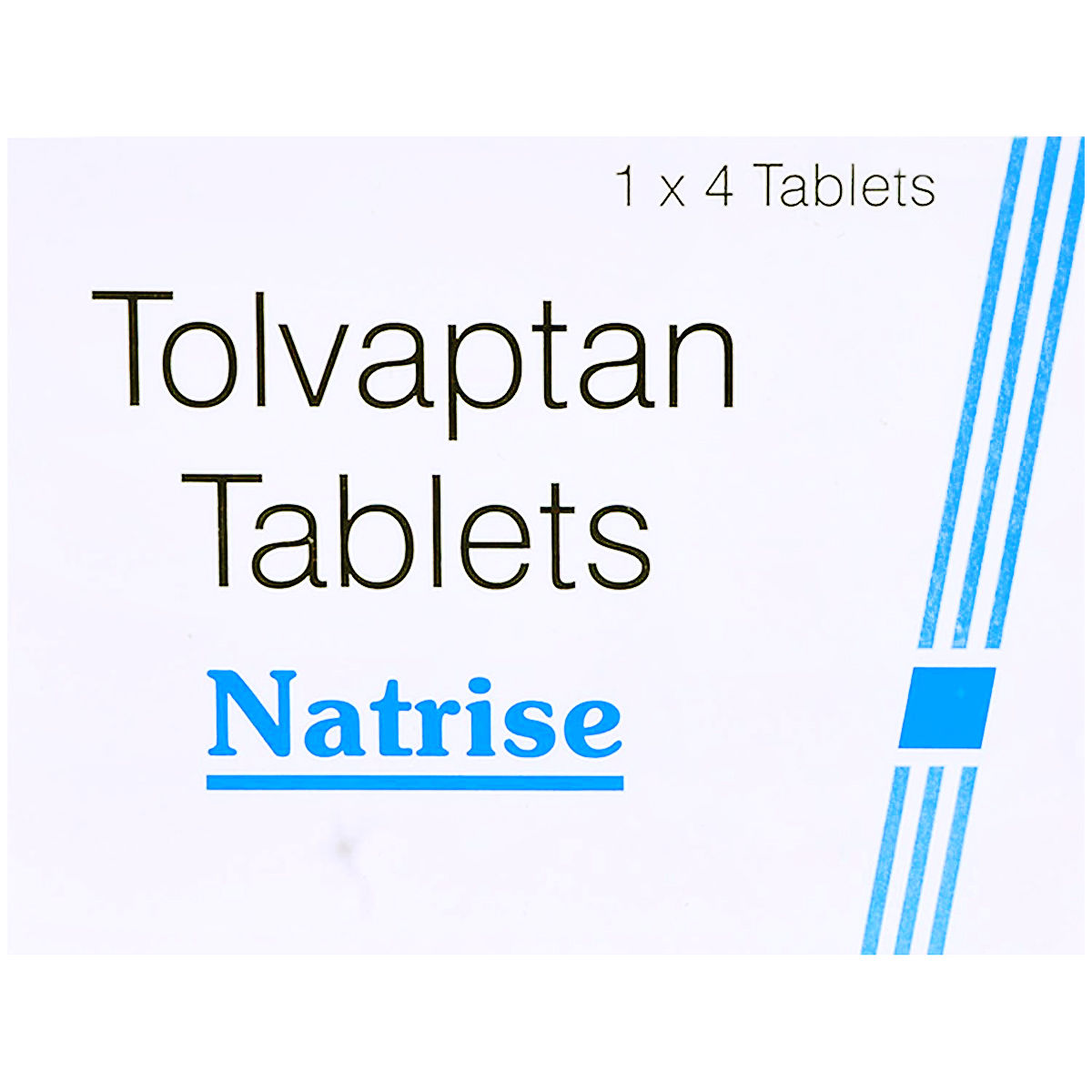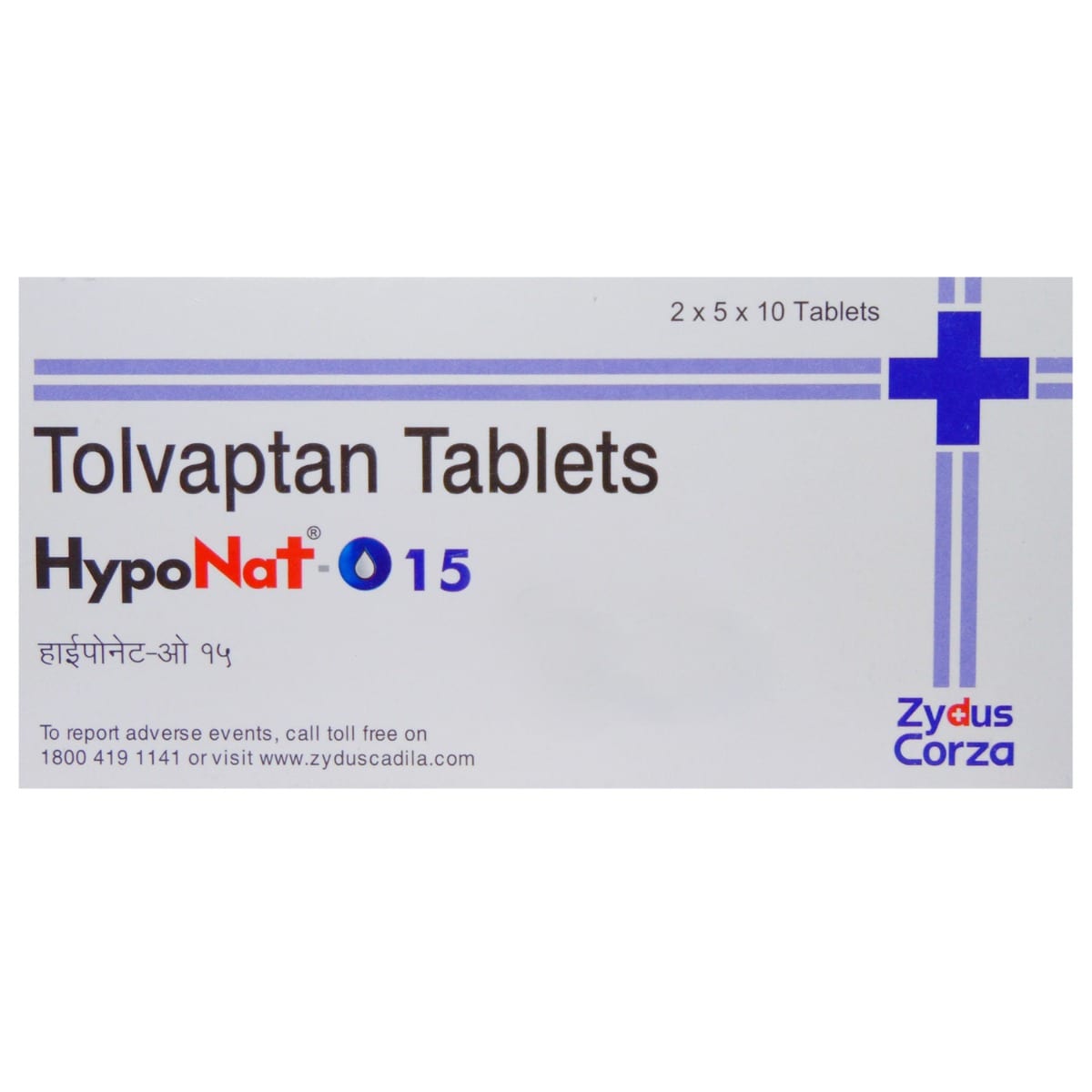Resodim 15 Tablet 4's





₹722.7*
MRP ₹803
10% off
₹682.55*
MRP ₹803
15% CB
₹120.45 cashback(15%)
Free Delivery
With Circle membership
(Inclusive of all Taxes)
This offer price is valid on orders above ₹800. Apply coupon PHARMA10/PHARMA18 (excluding restricted items)
Know Your Delivery Time
Provide Delivery Location
Available Offers
 Prescription drug
Prescription drugWhats That
 13 people bought
13 people bought 
Secure Payment

India's Most Trusted Pharmacy

Genuine Products
Composition :
Manufacturer/Marketer :
Consume Type :
Return Policy :
Expires on or after :
About Resodim 15 Tablet
Resodim 15 Tablet is used to treat hyponatremia (low levels of sodium) in patients with heart failure, liver disease and hormonal imbalances such as Syndrome of Inappropriate Antidiuretic Hormone (SIADH). Additionally, Resodim 15 Tablet is also used to treat autosomal dominant polycystic kidney disease (ADPKD).
Resodim 15 Tablet contains ‘tolvaptan’ that works by blocking the effect of vasopressin, resulting in decreased water reabsorption, a net increase in free water excretion (aquaresis) and an increase in serum sodium concentrations. This decrease in free water is not associated with an increased excretion of sodium or potassium ions; the increase in serum sodium concentration is solely a result of increased urine production.
You are advised to take Resodim 15 Tablet as long as your doctor has prescribed it for you, depending on your medical condition. In some cases, you may experience certain common side effects such as dizziness, headache, dry mouth, fatigue, diarrhoea, thirst and increased urge to urinate. Most of these side effects do not require medical attention and will resolve gradually over time. However, you are advised to talk to your doctor if you experience these side effects persistently.
Do not take Resodim 15 Tablet if you are pregnant as it may cause foetal harm. Consult your doctor before taking Resodim 15 Tablet if you are breastfeeding. Resodim 15 Tablet is not recommended for children below 18 years as the efficacy and safety have not been established. Resodim 15 Tablet may cause dizziness, so drive with caution. Avoid consuming alcohol as it might cause increased dizziness. Inform your doctor about all the medicines you are taking and about your health condition to rule out any unpleasant side effects.
Uses of Resodim 15 Tablet
Directions for Use
Medicinal Benefits
Resodim 15 Tablet belongs to a group of medicines called vasopressin V2 receptor antagonist. Resodim 15 Tablet is used to treat hyponatremia (low levels of sodium) in patients with heart failure, liver disease and hormonal imbalances such as Syndrome of Inappropriate Antidiuretic Hormone (SIADH). Besides this, Resodim 15 Tablet is also used to treat autosomal dominant polycystic kidney disease (ADPKD). Resodim 15 Tablet works by blocking the effect of vasopressin, a hormone which is involved in the formation of cysts in ADPKD patients. By blocking the effect of vasopressin, Resodim 15 Tablet slows down the development of cysts in kidneys and reduces the symptoms of the disease. Resodim 15 Tablet antagonises the effect of vasopressin; this results in an increase in free water clearance and decreases urine osmolality due to increased urinary excretion, thereby increasing serum sodium concentrations.
How Resodim 15 Tablet Works
Storage
Side Effects of Resodim 15 Tablet
- Dizziness
- Headache
- Dry mouth
- Fatigue
- Weakness
- Diarrhoea
- Thirst
- Increased urge to urinate
What if I have taken an overdose of Resodim 15 Tablet
Drug Warnings
Do not take Resodim 15 Tablet if you are allergic to any of its contents, if you have raised liver enzymes in the blood, very low blood volume, if there is no urine production, if you cannot tell that you are thirsty. Inform your doctor if you have liver disease, difficulty in urination, diabetes, high levels of uric acid, advanced kidney disease or if you have to restrict fluid intake due to certain medical conditions. Do not take Resodim 15 Tablet if you are pregnant as it may cause foetal harm. Consult your doctor before taking Resodim 15 Tablet if you are breastfeeding. Resodim 15 Tablet is not recommended for children below 18 years as efficacy and safety have not been established. Resodim 15 Tablet may cause dizziness, so drive with caution. Avoid consuming alcohol as it might cause increased dizziness.
Drug-Drug Interactions
Drug-Drug Interactions
Login/Sign Up
When Resodim 15 Tablet 4's and Delavirdine are taken together, may significantly increase the blood levels and effects of Resodim 15 Tablet 4's.
How to manage the interaction:
There may be a possibility of interaction between Resodim 15 Tablet 4's and Delavirdine, but it can be taken if prescribed by a doctor. If you notice any of these signs -difficulty swallowing, trouble speaking, muscle weakness, trouble controlling body movements, confusion, mood changes, seizures, call a doctor right away. Do not stop using any medications without a doctor's advice.
When Resodim 15 Tablet 4's is taken with Mifepristone, it may increase the levels of Resodim 15 Tablet 4's, which may increase the risk of side effects.
How to manage the interaction:
Taking Resodim 15 Tablet 4's and Mifepristone together is not recommended, but it can be taken if prescribed by a doctor. If you notice any of these signs -difficulty swallowing, trouble speaking, muscle weakness, trouble controlling body movements, confusion, mood changes, seizures, call a doctor right away. Do not stop using any medications without a doctor's advice.
When Resodim 15 Tablet 4's and Clarithromycin are taken together, may significantly increase the blood levels and effects of Resodim 15 Tablet 4's.
How to manage the interaction:
There may be a possibility of interaction between Resodim 15 Tablet 4's and Clarithromycin, but it can be taken if prescribed by a doctor. If you notice any of these signs -difficulty swallowing, trouble speaking, muscle weakness, trouble controlling body movements, confusion, mood changes, seizures, call a doctor right away. Do not stop using any medications without a doctor's advice.
Co-administration of Resodim 15 Tablet 4's and Itraconazole may significantly raise Resodim 15 Tablet 4's blood levels and effects.
How to manage the interaction:
There may be a possibility of interaction between Resodim 15 Tablet 4's and Itraconazole, but it can be taken if prescribed by a doctor. If you notice any of these signs -difficulty swallowing, trouble speaking, muscle weakness, trouble controlling body movements, confusion, mood changes, seizures, call a doctor right away. Do not stop using any medications without a doctor's advice.
Co-administration of Amprenavir with Resodim 15 Tablet 4's can increase the risk of side effects of Resodim 15 Tablet 4's.
How to manage the interaction:
There may be a possibility of interaction between Resodim 15 Tablet 4's and Amprenavir, but it can be taken if prescribed by a doctor. If you notice any of these signs -difficulty swallowing, trouble speaking, muscle weakness, trouble controlling body movements, confusion, mood changes, seizures, call a doctor right away. Do not stop using any medications without a doctor's advice.
When Resodim 15 Tablet 4's is taken with Ketoconazole, may increase the risk of side effects.
How to manage the interaction:
Taking Resodim 15 Tablet 4's with Ketoconazole is not recommended as it can lead to an interaction, it can be taken if prescribed by a doctor. However, if you notice any of these signs -difficulty swallowing, trouble speaking, muscle weakness, trouble controlling body movements, confusion, mood changes, seizures, call a doctor right away. Do not stop using any medications without a doctor's advice.
When Resodim 15 Tablet 4's and Saquinavir are taken together, may significantly increase the blood levels and effects of Resodim 15 Tablet 4's.
How to manage the interaction:
There may be a possibility of interaction between Resodim 15 Tablet 4's and Saquinavir, but it can be taken if prescribed by a doctor. If you notice any of these signs - like difficulty swallowing, trouble speaking, muscle weakness, trouble controlling body movements, confusion, mood changes, seizures, call a doctor right away. Do not stop using any medications without a doctor's advice.
When Resodim 15 Tablet 4's and Atazanavir are taken together, may significantly increase the blood levels and effects of Resodim 15 Tablet 4's.
How to manage the interaction:
There may be a possibility of interaction between Resodim 15 Tablet 4's and Atazanavir, but it can be taken if prescribed by a doctor. If you notice any of these signs -difficulty swallowing, trouble speaking, muscle weakness, trouble controlling body movements, confusion, mood changes, seizures, call a doctor right away. Do not stop using any medications without a doctor's advice.
Co-administration of Boceprevir and Resodim 15 Tablet 4's may significantly increase the blood levels and effects of Resodim 15 Tablet 4's.
How to manage the interaction:
There may be a possibility of interaction between Resodim 15 Tablet 4's and Boceprevir, but it can be taken if prescribed by a doctor. If you notice any of these signs -difficulty swallowing, trouble speaking, muscle weakness, trouble controlling body movements, confusion, mood changes, seizures, call a doctor right away. Do not stop using any medications without a doctor's advice.
When Resodim 15 Tablet 4's is taken with Fosamprenavir, may significantly increase the blood levels and effects of Resodim 15 Tablet 4's.
How to manage the interaction:
There may be a possibility of interaction between Resodim 15 Tablet 4's and Fosamprenavir, but it can be taken if prescribed by a doctor. If you notice any of these signs -difficulty swallowing, trouble speaking, muscle weakness, trouble controlling body movements, confusion, mood changes, seizures, call a doctor right away. Do not stop using any medications without a doctor's advice.
Drug-Food Interactions
Drug-Food Interactions
Login/Sign Up
Grapefruit
How to manage the interaction:
Consuming grapefruit juice while taking Resodim 15 Tablet 4's can increase the effects of Resodim 15 Tablet 4's. Avoid taking Resodim 15 Tablet 4's with grapefruit juice.
Diet & Lifestyle Advise
- Eat a diet rich in whole grains, vegetables, and fruits.
- Avoid smoking and alcohol consumption.
- Maintain a healthy weight with proper diet and exercise.
- Manage stress with meditation, yoga, and massage.
- Drink plenty of fluids.
- Rehydration beverages that contain electrolytes are also helpful.
Habit Forming
Therapeutic Class
Resodim 15 Tablet Substitute

Natrise Tablet 4's
by Others
₹132.07per tabletHyponat-O 15 Tablet 10's
by Others
₹67.28per tabletTolvat 15 Tablet 4's
by Others
₹138.60per tabletVaptan Tablet 10's
by AYUR
₹90.00per tabletTolvasca-15 Tablet 4's
by Others
₹185.53per tablet
Product Substitutes
Alcohol
Unsafe
Avoid consuming alcohol while taking Resodim 15 Tablet as it may cause increased dizziness.
Pregnancy
Unsafe
Resodim 15 Tablet belongs to pregnancy category C. Resodim 15 Tablet is not recommended for use in pregnant women as it may cause foetal harm. Women of childbearing age must use effective contraception while taking Resodim 15 Tablet.
Breast Feeding
Unsafe
Resodim 15 Tablet is not recommended for use in breastfeeding women. Consult your doctor if you are breastfeeding; your doctor will decide whether Resodim 15 Tablet can be taken by breastfeeding mothers or not.
Driving
Caution
Resodim 15 Tablet may cause dizziness, weakness and tiredness. Do not drive or operate heavy machinery if you feel dizzy.
Liver
Caution
Dose adjustment may be needed. Resodim 15 Tablet should be used with caution in patients with liver impairment/liver disease. Please consult your doctor if you have liver problems or any concerns regarding this.
Kidney
Caution
Resodim 15 Tablet should be used with caution in patients with kidney impairment/kidney disease. Please consult your doctor if you have kidney problems or any concerns regarding this.
Children
Unsafe
Resodim 15 Tablet is not recommended for children below 18 years as efficacy and safety have not been established.
FAQs
Country of origin
Manufacturer/Marketer address
Customers Also Bought
Disclaimer
Author Details
We provide you with authentic, trustworthy and relevant information





























